2010.10.29[Event Reports]
10/29 (Fri) Competition Section "The Invisible Eye" Press Conference and Q&A: Notes & Quotes

Press Conference: October 29th (Friday), from 16:15 @TIFF Movie Café
Q&A Session: October 30th (Saturday) from 18:35 @TOHO Cinemas Roppongi Hills Screen 6
Appearance: Diego Lerman (director/screenplay/producer), Julieta Zylberberg (actress)
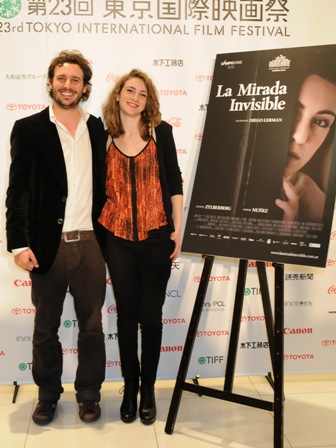
Here are some notes and quotes:
Julieta Zylberberg (JZ): It's our first time to come to the Tokyo International Film Festival. We're having a great time.
Diego Lerman(DL): I'm very happy to be here screening our movie. I'm also honored to be here representing our film.
Q: This film is based on a novel written by Martin Kohan. When did you read this book and decide to adapt it into a film?
DL: I read it on February 22, 2008 at 3 o'clock in the afternoon... OK, that's a joke! But yes, I did read it in 2008 and I immediately wanted to adapt the story into a film. I met Martin Kohan right away and we started shooting in December 2009 until February 2010, the summer season in South America. The reason why we shot it during the summer was because schools were on vacation.
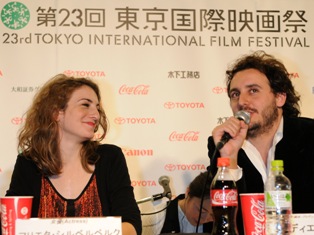
Q: This film is very different from your last film, Tan De Repente. The boy who Mar├Ła Teresa falls for is not very handsome according to Japanese standards. Why was she attracted to him?
DL: To tell the truth, we didn't want the boy to be a typical handsome boy with blond hair and blue eyes. I chose that boy because he had very deep and pensive eyes, almost like an angel and I found them very attractive.
Q: How did you meet Julieta?
DL: When I decided to make an adaptation of the novel, I thought that Julieta would be perfect for that role. I've seen her in some other films and I was sure that she was a great actress and I am very happy with what she did.
Q: Julieta, how did you feel when you were offered the role? Had you already read the book at that point?
JZ: Diego contacted me when he finished the first rough script and I was very attracted to the story and the character. As for the book, I read it while going through the script with the other actors.
Q: Diego, you were born in 1976 during the times of military dictatorship. How were you influenced by this?
DL: I was born on March 24, 1976, the very day the coup'd'état took place in Buenos Aires. The military dictatorship in Argentina was during my childhood so I don't remember much of it. However, my parents were involved in anti-government activities so we would live in hiding, moving from one place to another. But these are all vague and abstract memories. I remember feeling fear, seeing adults engaged in serious discussions, and people disappearing all of a sudden. I have relatives who have fled to Ecuador and others who are, what we call 'missing'ŌĆökilled by the government army.
Q: The visuals of this movie are very beautiful. What were the aesthetics you were conscious of during filming?
DL: I didn't want to express my aesthetics rigidly. That is because the story and ambience of the film is already quite rigid. I also wanted to use Mar├Ła Teresa's subjective perspectives and sensations. In order to express this, I was conscious of moving the camera at all the times but at the same time, I wanted to capture what the camera was not shooting. So my starting point was to show the world through Mar├Ła Teresa's eyes.
I've had several favorite film directors over the times. I like directors who make films that touch my heart. That feeling is like magic, inexplicable beyond words. If I had to name one director, it would probably be Luis Bu├▒uel.
At the Q&A Session this evening, Zylberberg on commented Mar├Ła Teresa's character.
JZ: She is a very strict person but at the same time, she feels desire toward her student. I wanted to express her rigidness and desire as well as the tension created by both qualities. I worked very closely with the director and the cast many months prior to shooting. Mar├Ła Teresa's character evolves as the story progresses. In the beginning, she is attracted to Biasutto but soon loses interest in him. She also becomes obsessed with catching students smoking. This has to do with how she came in touch with her own feelings and of all the past sexuality she had that had been reprimanded, which made her a more humanly person.
DL: One of the issues we had was to decide on how Mar├Ła Teresa would walk. I asked Julieta to try different ways of walking until we found the one that matched Mar├Ła Teresa's image. We also talked a lot about her rigid personality and that from within that rigidness came a lot of shades of color. She is always mentally active. This is what I wanted to convey to Julieta and she did a wonderful job expressing this.
The Invisible Eye
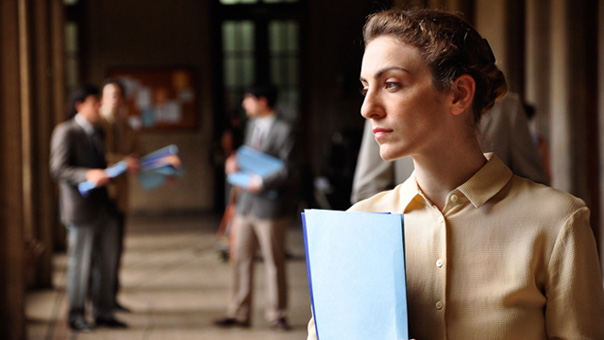 Film Information
Film Information
2010.10.29[Interviews]
Winds of Asia-Middle East ŌĆ£Ways of the SeaŌĆØ Interview with Sheron Dayoc (Director), Lilit Reyes (Producer), Maria Isabel Lopez (Actress) (10/29)

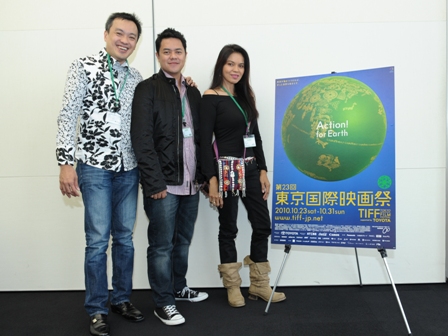
---Did you make this film because of the illegal immigration in your hometown?
Sheron Dayoc (Dayoc): Yes. My hometown is where stowaways set sail from and deportees from Malaysia return to. The number of deportees increased from about 2002 when the government started to tighten the controls. The death rate went up at the same time due to lack of air or food as they are so tightly packed on the ship. I learned a lot from lawyers who are dealing with such cases. This film is based on real cases.
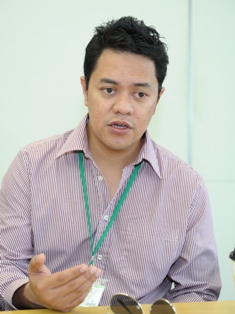
---You have made documentaries before this film, but why did you make this a narrative film?
Dayoc:I was going to make a documentary, but I would have needed to board the same vessel as the stowaways, and cross the boarder to Malaysia. It is too much of a risk and almost impossible, that is why I made it into a narrative film. But I believe the audience can sense the same message as a documentary.
---As a producer, how did you proceed with the production?
Lilit Reyes (Reyes): We secured the funding of 1 million yen from Cinemalaya film festival (gateway for young film directors), but that is not enough to complete a film. The fund ran out half way through the production, yet the film sincerely portrays PhilippinesŌĆÖ compelling issue and I really wanted to complete it. I relied on some of my friends in an advertisement company, who provided some of the sound and music for free.
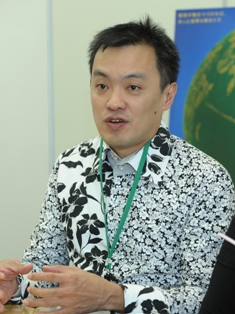
---Maria, you are a top actress in the Philippines. What encouraged you to perform in this film?
Maria Isabel Lopez (Lopez): I did not know SheronŌĆÖs name, but I found out he was a promising director, young but not cocky. I read the script and I realised that it is an important film, which should be known by many people.
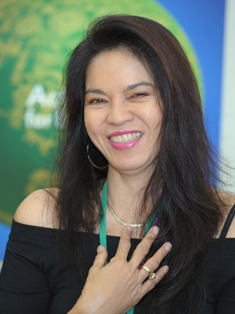
---I would think many illegal immigrants will just clam up. The research must have been difficult.
Dayoc:I heard a lot of stories from people who have been deported back here. There is a place where these people are temporarily housed. There were some who just didnŌĆÖt want to talk to us, but the communication improved after we started to provide a questionnaire via the social worker. Some were really keen to tell us what hardships they had endured. All the stories have been incorporated in the script and the end result is {Ways of the Sea}.
---ItŌĆÖs a sensitive issue in the Philippines. Were you criticized or bashed?
Dayoc:Not all the stowaways are from Zanboanga, and many are from other regions. But when they are sent back here, the local authority must bear the cost of housing and feeding them as well as providing some transportation subsidy. So the mayor of Zanboanga did not approve of accepting illegal immigrants for economic reasons. He wanted as many people as possible to know about the problem so he was very cooperative.
---Many scenes are filmed on the sea at night. Shooting must have been difficult.
Dayoc: When we filmed on the ship, the only light sources were lamps, and it lasted only for a few hours. I had to shoot everything within 4 hours, so it was difficult.
Lopez:When we filmed in the mangrove forest, it was like a swamp on the ground. SomeoneŌĆÖs boots got stuck in the mud, a boot fell off his foot, and he got bitten by a sea serpent. Rescue crew was with us but still, it was very scary.
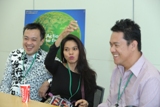
---YouŌĆÖve completed it, despite many difficulties, and it must have been worth it.
Dayoc: Both cast and crew worked really hard and enthusiastically, I feel lucky to have been supported by them. Budget was limited, location was difficult, but every one said at the end that they really enjoyed it. It was a big challenge, but I had a wonderful experience.
---How do you feel about its screening at the TIFF?
Dayoc:The issue is why do the Philippines take such an enormous risk to stay as illegal immigrants without any prospect for the future? We need to think about this. We went to Pusan, too. It is truly meaningful to have this screened in every country in Asia. The screening in Tokyo has been a wonderful experience.
Ways of the Sea
Film Information
2010.10.29[Event Reports]
10/29 (Fri) Q&A - natural TIFF "Waterlife" Kevin McMahon (Director)


Waterlife, a 2009 documentary by Canadian director and writer Kevin McMahon, shows that substantial challenges remain today. The film focuses on the numerous environmental problems facing the five Great Lakes, situated between the U.S. and Canada. The beautiful home to thirty-five million people and the source of 20 percent of the worldŌĆÖs supply of fresh water, the lakes are shown to also be a mix of human waste, industrial chemicals, pharmaceuticals and invasive predators, such as sea lampreys, which have led to a substantial decline in lake trout.
With an airy and poppy soundtrack that includes Brian Eno, Sufjan Stevens, and Sigur Ros, McMahon documents the cancer-stricken beluga whales in the St. Lawrence River, the bacterial pollution of the Chicago River and the high level of estrogen in Lake Erie, which is slowly turning male frogs into females.
McMahon was on hand at the TOHO CINEMAS ROPPONGI HILLS for a screening on Friday. An enthusiastic group of film fans were in the audience to ask him questions afterward.
Q: Could you offer some opening words?
Kevin McMahon (KM): I would like to say thank you very much to the Tokyo International Film Festival for inviting Waterlife to come and screen here. It's a great honor to be part of the festival.
Q: There are many possible themes for films. Why did you choose water?
KM: My hometown is Niagara Falls [Ontario]. So I grew up as a child around a lot of water. I''ve seen that water become polluted over time so I was concerned about that and wanted to make a movie about this problem.
Q: How long did the shooting take?
KM: It took about a year to shoot the film.
Q: There are many different types of shots in the film. What was the percentage of computer graphics [CG] used?
KM: It's fairly small. I don't know what percentage. But it was necessary to use some CG because we can't understand what the pollution in the water is doing to us unless we can see it at a molecular level and you can't film at a level like that.
Q: This movie covers many different places. By watching on the big screen I could really understand the whole picture - from the, as you said, molecular level to shots showing the globe. Could you explain your intention?
KM: I think [of] the film as an autobiography of all of us because we are all made up water. Of course, for most of the people [living] where I live, this [the water in the film] is the water they drink. It's important to be able see it on every scale - from a molecular [level] to space. Because we all live in a hydrosphere, a big envelope of water that is moving constantly. The smallest molecule can change the way your body works but it is all part of a vast system.
Q: The narration was done sometimes by men and women without their face being shown. Sometimes we don't know who they are. Was that your intention?
KM: There are lots of people that talk through the film. Sometimes we see them, but mostly we don't. There are scientists, environmentalists, sometimes people who just live around the water, which is difficult sometimes for people [filmgoers]. But the reason I did it is, two reasons, one because the water is the character really, the hero, and these people are commenting all the time on the water. And the story is a collective story - it's everyone's story. So all these voices come together just like all the drops come together to make the water these voices all come together to tell the collective story of the water.
Q: The music was very vivid in this film. Japanese subtitles were included for the lyrics. What is your opinion of the music?
KM: Mostly in a documentary like this you don't use this kind of music. You don't usually use lyrics. These are all pop tunes. Most of these are independent Canadian and American musicians. I used them for a couple of reasons, one because I wanted to have different flavors of music, because the movie is like a road trip. So the music is like the kind of music you'd have on a road trip, where it's pop songs and as you go along [you'd listen to] different kinds of flavors of tunes. And because we wanted it to appeal to young people and to have something different that would kind of shake them up a little bit, instead of just atmospheric music.
Q: There was a scene where people with nets are in a boat catching flying fish. Can you describe that scene?
KM: That's a very strange thing. They call it a "redneck fishing derby." A redneck is hard to explain. It's an American term for rough, working-class people. Those fish are a kind of fish that if a boat goes by they'll jump out of the water and people will get hit. One guy [in the film] says they'll [the passengers] get their teeth knocked out. Some people get knocked out of boats. They are really ravenous ŌĆō they eat a lot. They accidentally got into that waterway near Chicago. Now there is a lot of concern they'll get into the Great Lakes because they reproduce rapidly and eat a lot of food. They'll eat out the other fish that live there. They are a strange phenomenon, those fish.
Q: What's the name of the competition again?
KM: They call it a redneck fishing derby because they catch the fish just by stirring up the water. They don't eat them. They destroy them. It's a waste, really, these fish, but Americans wonŌĆÖt eat them.
Q: They are trying to be number one by taking the most fish?
KM: They are just trying to destroy them.
Q: Did you want to try it?
KM: It looks like fun. But we just filmed it.
Q: Regarding drinking tap water or mineral water, can you describe the situation in Canada?
KM: Many people drink bottled water. Twenty years ago bottled water didn't exist in Canada. And then when people started to fear the water was polluted they started to drink bottled water. Now, there's a strong political movement against bottled water for a couple of reasons, one because it depletes the water from the groundwater, which is where it is taken from. Also because people realize, as they say in the film, it's just tap water put into bottles. Also there is concern about plastic in the bottles. The Canadian Government has just outlawed a kind plastic used in these bottles because it's toxic itself. So now there's a movement against using bottled water.
Q: Do you have any questions for the audience regarding water issues in Japan?
KM: I suppose. One thing I am curious about is whether the film makes sense for the audience. I don't know whether these kinds of problems exist here or not, whether people understood all these different things, like the pollution or the sewage or the invasive species. Do you have these problems in your fresh water lakes here?
Audience member: In this film, you are kind of stressing the role of humans. But I think maybe the lakes weren't on the Earth many years ago. So maybe it is natural for them to fade away or dry up [as easily as they appeared]. I think humans need not do anything. What is your opinion?
KM: He's talking about the water evaporating?
Audience member: If humans weren't here on Earth, the lakes could disappear on their own by drying up. What is your opinion?
KM: Well, maybe that's true. The scientists say that all the water on Earth has always been here. But sometimes it's been more fresh water or less, more in the oceans or less. The continents themselves have been together and then apart. So it's true ŌĆō there's a process of transformation going on. Personally, I think, in the Great Lakes anyway, the water level has always had cycles ŌĆō it's always gone up and down. But now instead of going like this [KM moves hand up and down] it is going like this [KM drops hand down]. It's consistently dropping. I think man-made climate change is real and when they [world nations] met 20 years ago, or whatever it was [1997], in Kyoto the scientists of the world thought it was real too. I am not a scientist but I take them at their word. The other problems, poison in water, we canŌĆÖt blame anybody but ourselves for those.
Audience member: It's not right to think that only humans are affecting the lakes. It is one factor but there are other animals too impacting nature as well.
KM: It may be true. [There are] other animals of course. We're all animals. Other animals do affect the water. I don't know. I can only say what most of the scientists tell me. I am curious to know, there's a scientist here, Matsumoto, or something like that [Masaru Emoto]. He's a Japanese scientist. He believes that you can project emotions onto water. If you speak with anger around water you'll affect the way the crystals form and so on. Is that commonly known, that research, here? Do people know about that?
[Audience members indicate they have knowledge of the concept.]
Many people are skeptical of that. I don't know. But I would say that, whether it's problems like climate change or water evaporating, whether it's our fault or whether itŌĆÖs some kind of natural process, it's only wise and right for us to treat everything with respect. When we have mass societies, many people consuming water, big factories that create a lot of pollution, it's difficult to maintain respect towards the rest of the world because it's hard to control those large forces. So I think if we are smart enough to be able to create these big systems we have to be smart enough to make the systems operate in a respectful way towards the rest of the world, not only the water and the air but all the creatures that depend on it.
Q: There are probably a lot of people who are against this film and others who are in favor of it. But maybe to think about this film is the most important thing. As a final question, what projects are you working on next?
KM: I have two projects I'm working on. Right now, I'm writing both of them and trying to raise money. One is a film like this [ŌĆ£WaterlifeŌĆØ], about the Boreal Forest, which is the big forest that wraps all around the north [of Canada]. I think maybe [it] barely touches northern Japan. The other is a documentary that will live only on the internet. It's an interactive documentary, and it's about nuclear weapons, which is something that I've worked on, on and off, for about 30 years to raise awareness, obviously a subject that would have resonance here. But many people arenŌĆÖt aware that there are all kinds of nuclear weapons in the world. So we are working on a project to try to raise awareness about that.
Q: We are looking forward to seeing your next projects here at the Tokyo International Film Festival in the future.
KM: I hope so too. Thank you again so much for having me here, a great honor.
Waterlife

2010.10.29[Event Reports]
Photo Report: 10/29 Guest Appearance
The Singing Hitman!: Stage Greeting @ TOHO CINEMAS ROPPONGI HILLS SCREEN2
Guest: Masao Kusakari(Actor), Yoka Wao(Actress), Claude Maki(Actor), Takashi Takahata(Director), zeebra(Theme Song)
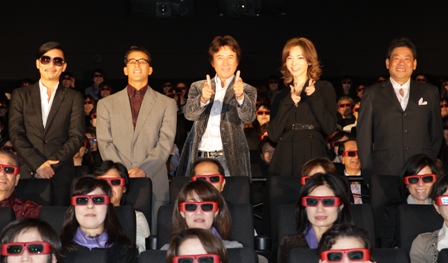

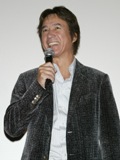
Winds of Asia-Middle East
MOSS (Original Title): Stage Greeting @ TOHO CINEMAS ROPPONGI HILLS SCREEN2
Guest: Kang Woo-suk(Director), Pakr Hae-il(Actor)
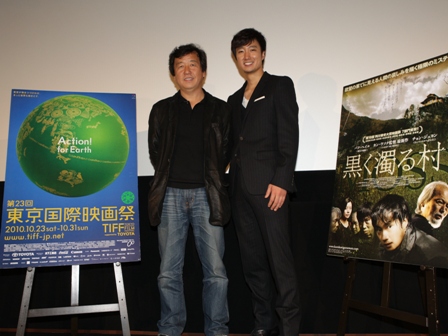
Competition
Brighton Rock: Q&A @ TOHO CINEMAS ROPPONGI HILLS SCREEN6
Guest: Rowan Joffe(Director)
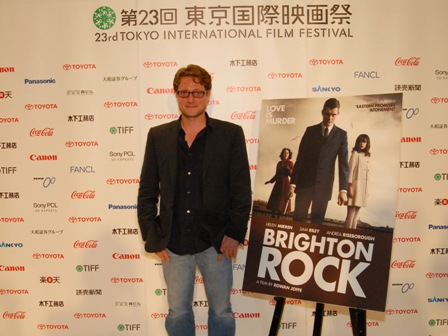
Winds of Asia-Middle East The 70th Anniversary: Bruce LEE to the Future
IP MAN 2: Talk Show @ TOHO CINEMAS ROPPONGI HILLS SCREEN5
Guest: Yasuaki Kurata(Actor), Jiro Chino(Film Critic), Kenji Ishizaka(Winds of Asia-Middle East Programming Director)
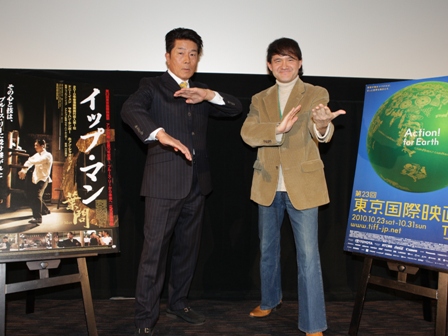
Japanese Eyes
Birthright: Stage Greeting @ TOHO CINEMAS ROPPONGI HILLS SCREEN6
Guest: Naoki Hashimoto(Executive Producer/Screenplay/Director), Sayoko Oho(Actress), Miyu Yagyu(Actress), Yoko Takizawa(Actress)
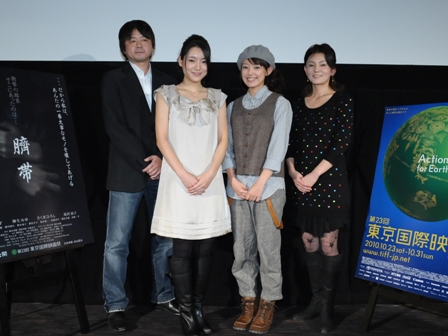
Competition
Intimate Grammar: Q&A @ TOHO CINEMAS ROPPONGI HILLS SCREEN7
Guest: Nir Bergman(Director/Screenplay), Orly Zilbershatz(Actress)
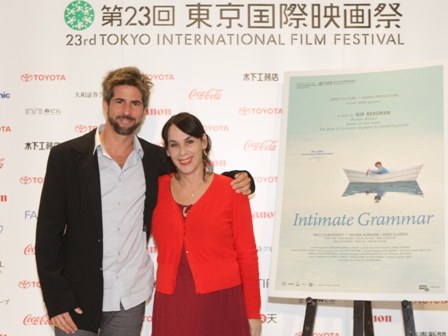
natural TIFF supported by TOYOTA
Waterlife: Q&A @ TOHO CINEMAS ROPPONGI HILLS SCREEN1
Guest: Kevin McMahon(Director/Screenplay)
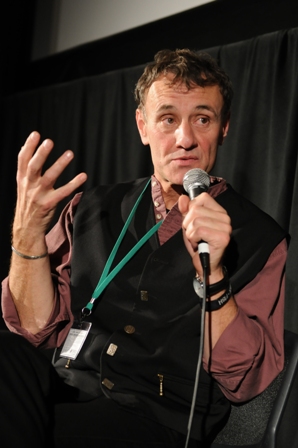
Bunka-Cho Film Week 2010 ŌĆō Here & There
Filmmaker's Angle The World of Yohei Taneda: Conference @ TOHO CINEMAS ROPPONGI HILLS SCREEN2
Guest: Yohei Taneda, Lee Chi-Ngai(Director), Su Chao-Bin(Director), Chiaki Kuriyama(Actress), Shinya Kawai(Producer), Masayuki Tanashima(Producer), Koko Maeda(Producer)
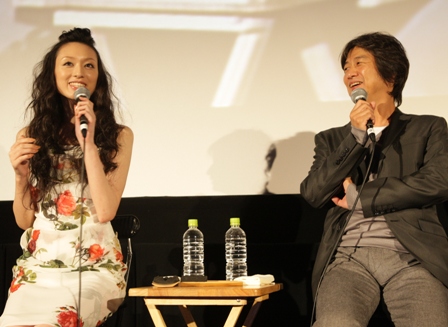
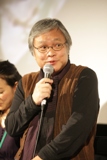

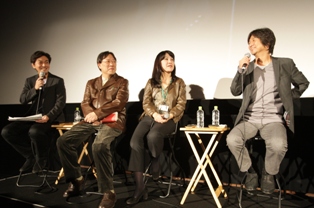
natural TIFF supported by TOYOTA
Two Gates of Sleep: Q&A @ TOHO CINEMAS ROPPONGI HILLS SCREEN1
Guest: Alistair Banks Griffin(Director/Screenplay)
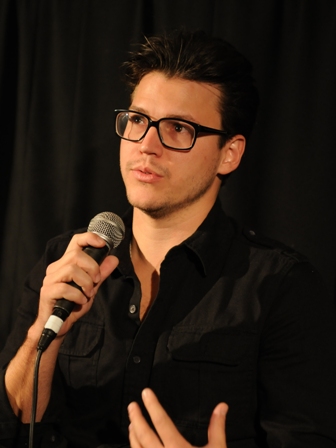
Competition
The Invisible Eye: Press Conference @ TIFF movie café
Guest: Diego Lerman(Director/Screenplay/Producer), Julieta Zylberberg(Actress)
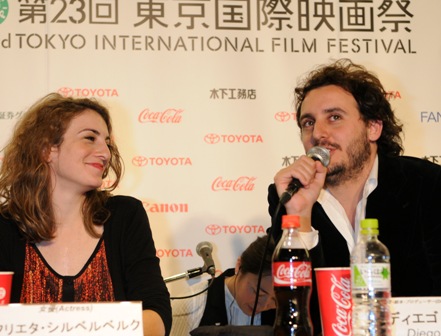

Winds of Asia-Middle East
Ways of the Sea: Q&A @ Cinemart Roppongi SCREEN1
Guest: Sheron Dayoc(Director/Writer/Producer), Lilit Reyes(Producer), Maria Isabel Lopez(Actress)
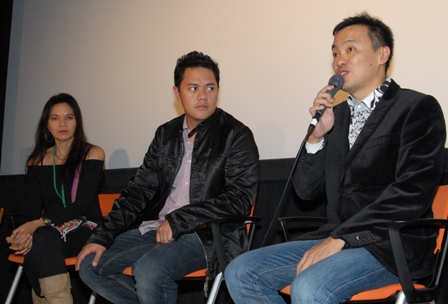

2010.10.28[Event Reports]
10/28 (Thu) Competition Section "Sketches of Kaitan City" Q&A, Press Conference: Notes & Quotes

Date & Time: October 28th (Thursday), from 15:40 @Movie Caf├®
Appearance: Kazuyoshi Kumakiri (director), Kaoru Kobayashi (actor), Kaho Minami (actress), Masaki Miura (actor), Ryo Kase (actor)
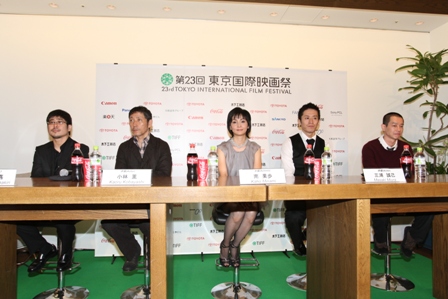
Here are some notes and quotes:
Kazuyoshi Kumakiri (Kumakiri): This film is filled with the love and passion of the people involved in making this film. It is an honor to have it screened at the Tokyo International Film Festival.
Kaoru Kobayashi (Kobayashi): The budget for this film was collected in a unique way. Many people of Hakodate City, Hokkaido contributed 10,000 yen each, but still, this film was shot on a very low budget. The people were extremely supportive; they would make us lunch and take care of our transportation to the location sites. This film was definitely made by the local people and it turned out to be a wonderful film.
Kaho Minami (Minami): As Mr. Kobayashi said, the people of Hakodate City, in the film, Kaitan City were very helpful. The people, land, air, and scenery are all inside this film. Actually, many of the citizens were casted in the film, for example, my son was played by a high school boy from Sapporo City. In a sense, there was no border between the staff, cast, and the local people. It was a great collaboration which I see as a new and promising style of production. Therefore, when you think of the kind of director who is able to lead this type of production, you would probably imagine someone with a loud voice and a lot of power. Mr. Kumakiri is just the opposite. He only whispers a few words into our ears in a reserved manner. In any case, I love his films and am very happy to be a part of his team in this film.
Masaki Miura (Miura): Of all the films that exist in the world, this is the one film I really want to see and want others to see as well. I feel a strong sense of responsibility being a part of the cast when I think of the people in Hakodate because this film will not have been possible without their support. As for acting, the director gave me a lot of time and freedom to come in touch with my role. There were times when we waited for the snow to fall or the sun to come out, which felt like the old style of filmmaking. Therefore, this film drastically changed the way I think as an actor.
Ryo Kase (Kase): I'm very happy that in such times, such a small project became a film. Thank you all for coming today.
Q: How was it working with amateur actors in Hakodate?
Kase: There were some wonderful and unexpected coincidences while working with the Hakodate people, which added to the special atmosphere of this film. After 10 years of acting, I was probably getting too used to being an actor. So this movie gave me a chance to reflect back on when I started acting. There was a lot to learn from these people.
Kobayashi: Umm... if an actor as fresh as Mr. Kase feels the need to refresh and restore his acting style, how much cleaning up would I need to do after decades of acting (laugh)?! On a more serious note, as a professional actor, it is inevitable that you eventually lose the initial excitement and anxiety of performing. Therefore, working with amateur actors gave us the chance to reconsider acting from their perspective.
Q: The film captured the reality of the people's very well. Were some artistic strategies used to capture this?
Kumakiri: What I wanted to covey in this film is precisely thatŌĆöthat the characters feel real. This film is just one page of their lives. There was a life before and that there will be life after.
At the Q&A Session following the Press Conference, Kazuyoshi Kumakiri commented on the process of reproducing his film from a book. The film is based on an original novel by Yasushi Sato. The novel has 18 episodes, which were too many to include in a single film. Kumakiri chose 5 of the episodes that impressed him the most, a very difficult process, he admitted.
He also shared an episode of how he scouted an elderly woman sitting in the backstreets of Hakodate City. He was immediately inspired to include her in the film as she represented a local person very realistically. He surprised the audience by disclosing the fact that "...the actors and actresses you don't recognize in the film are all local residents!"
Sketches of Kaitan City
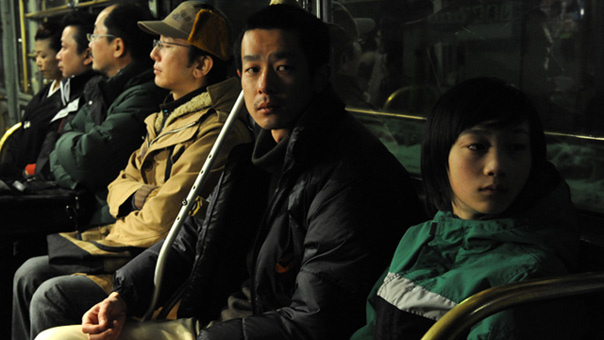
2010.10.28[Event Reports]
10/28 (Thu) Competition "The Piano in a Factory" Press Conference: Notes & Quotes

Date & Time: October 28th (Thursday), from 13:00 @Movie Café
Appearance: Zhang Meng (director/screenplay), Wang Qian-yuan (actor), Jessica Kam (producer), Choi Gwang-suk (producer)
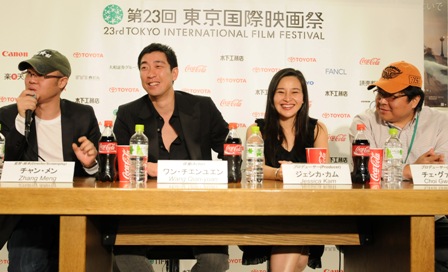
Here are some notes and quotes:
Zhang Meng (ZM): I love Tokyo and I love the Tokyo International Film Festival.
Wang Qian-yuan (WQY): I am very excited to see so many members of the press here today. It's also great that our film is in the Competition section. I hope everybody will enjoy this film.
Jessica Kam (JK): We had a chance to meet so many great producers, directors and filmmakers. We've learned a lot.
Choi Gwang-suk (CGS): It is an honor to have our film at this wonderful festival.
Q: This film uses various kinds of music such as Russian and Spanish folk music. Did you have any particular effect in mind and what is the relationship to the theme?
ZM: When you use music from different countries, some are melancholic or passionate. Most of the music I used is from Russia and Germany because these are, or were two socialist countries. I wanted to have a touch of the socialist times in this film because China is socialist, and using such music makes these 3 countries resonate with each other. The Russian folk music, Troika is popular in China. There was a time when a lot of people from the Soviet Union came to north eastern China which is how this song spread throughout China. As for the song "Kampai" by Tsuyoshi Nagabuchi, I must say that as a lot of music came in to China through Taiwan and Hong Kong, I wasn't aware it was a Japanese song.
Q: Mr. Zhang, how did you come up with this story? Mr. Wang, do you have a memorable gift from your father?
ZM: What motivated me to come up with this story is quite simple. Presently, China's economy is growing very rapidlyŌĆöperhaps too rapidly. I feel that a lot of people are being left behind. Through these changing times, it was the factory workers who contributed to China's current growth. I wanted to remember that fact, especially in times when it seems a luxury to stop and reflect upon the past.
WQY:The love of a father towards his child is very deep anywhere in the world. How this love is expressed varies from person to person. I remember as a child, my father handmade me toy guns and sleds. Actually, while shooting this film, the director gave me a very special chance to be in the film with my father who has been an actor for 50 years now. He plays the role of an old factory technician called Wang. During the shooting, my 70-year-old father was constantly looking out for me and I really felt his deep affection. I love my role in this film and I love my father, too.
Q: How did the two producers from Korea and Hong Kong get involved in this film?
JK: It is indeed an international team that we have. The director and actors are from China and I myself am from Hong Kong and the United States. I met the director at the Shanghai International Film Festival last year. He was pitching this story to investors. I red the story, loved it, and decided to produce it with him. We also have Kwak Jae-young, the director of My Sassy Girl as our executive director, and our cinematographer is Shu Chou from Taiwan. ItŌĆÖs a great experience working in such an international environment except for that we need so many interpreters!
CGS: Previous to this film, I was involved in the film, Lucky Dog with Mr. Zhang Meng. We were already talking about making this film together since then.
ZM: Our team really is international but we are all film loversŌĆöour common goal is to create a wonderful film. Perhaps if we had a large budget things might have been different, yet all we had was passion. I am extremely grateful for the actors and staff because they all got together without guarantee of any payment. Thank you so much.
The Piano in a Factory
 Film Information
Film Information
2010.10.28[Event Reports]
10/28 (Thu) Q&A - Competition "Beautiful Boy" Shawn Ku (Director)

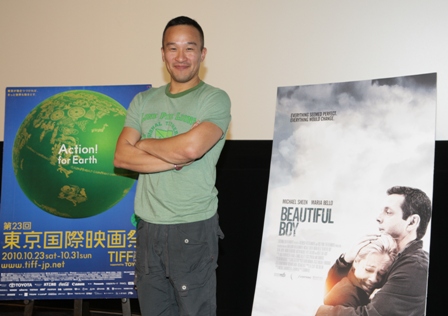
American director and writer Shawn Ku's new film Beautiful Boy tells the story of a husband and wife who must deal with the aftermath of their 18-year-old son's murderous rampage during his freshman year at college. With a feeling similar to a documentary, the drama, featuring Welsh actor Michael Sheen and American actress Maria Bello, explores the emotional and physical strains placed upon a family following such a tragedy, one whose impact is seemingly never ending.
Ku was on hand at the Toho Cinemas Roppongi Hills for a screening on Thursday. An enthusiastic group of film fans were in the audience to ask him questions afterward.
Q: Before we start the Q&A, could you offer some opening words?
Shaun Ku (SK): I don't know what to say. Thank you all for coming out so late to the screening. Thank you for staying.
Q: Good evening. Why did you choose Beautiful Boy for the title? Did you have any particular thoughts or a concept in mind?
SK: I think the significance of the title is how the parents tried to maintain the idea of their son alive. They are trying to keep that idea of him as a beautiful person. I don't think there is any parent who has a child who, no matter what they do or how bad [they are], that doesn't want to maintain some idea of the beauty of their child.
Q: You knew from the beginning that you wanted that title?
SK: No, not from the very beginning. Definitely, it was something that came eventually. But it was always going to be a story about the parents and not about the child, not about the shooting. It was always going to be about their relationship. But I guess we came to realize that as much as we wanted it to be just about the parents it is hard to avoid the child. He's in a very small part of the movie and yet he has a presence over the entire film.
Q: Welcome to Japan. Thank you very much for the wonderful film. His parents may not be ideal but his mother seems to be a warm person and the father is a hard-working man. So I kept wondering: Why did he have to do that [the shooting]? And I think the son loved the parents too and he did not grow up in such a bad environment. So I would like to know your motivation. Why did he have to do that?
SK: I think for us the thought was, not just for parents and children, but for anybody in a family, there is a level that you know somebody. I think there is more that you don't know. We are not saying that it is the parents' fault at all. It is just that there comes a time in life when things happen and you don't know why, and I think that is sort of the point of the movie to a certain extent. They are searching for a reason why, and they'll never know completely what their son was doing or going through because they weren't that kind of family that talked about those things. I think there are few families that are that open. That is sort of the kernel of it.
Q: I am an American citizen and I have seen a lot of this on the news about school shootings, and I just wanted to know personally what exactly influenced you. Was it something personal to you or what?
SK: Well, as I said, the story is intended to be an exploration of families and how well you really know somebody that you are intimate with. But for me personally, the inspiration comes from two places. When Virginia Tech happened it was very traumatic for my family to a certain extent because both of my parents went to school there. They met there. My sister was born there. And also because he [the shooter] was Asian, it was very personal. Even though we didn't lose anyone [relatives or friends] in the shooting, it was oddly personal. Also, subsequent to that, a close friend died in my home. He was just visiting. It was a completely unexpected death in his sleep. I got drawn into his family's grief and became a pivotal witness to their grief and the spiral of their grief. So it was really the synthesis of those two things.
Q: I would like to ask about the actors. One of the appealing things about this film is Michael Sheen's acting performance. It is really superb. I would like to know about your casting process.
SK: They [Sheen and Bello] were both my first choices, obviously. It was difficult to get to them, as it is [usually] with two big actors. But once we got through all of the guards and the red tape, and they actually got the scripts, it was very easy once they read the material. I thought I would have to convince them but there was no convincing. They worked for nothing. Our budget was very low, and they felt passionate about the project. So I was grateful for that. Yeah, he [Sheen] is a fantastic actor.
Q: It's a really wonderful story that you have shared with us. Like Harvey Keitel's appearance in Tarantino's early film Reservoir Dogs, a world-famous star has appeared in a film of an up-and-coming filmmaker. I think this is very hopeful for any aspiring filmmakers who might be here. So could you share with us the secret or tip to getting a big star to appear in a film?
SK: I personally did very little persuading. It was all from the material. I think actors like these are driven by their desire to play different characters. I think he [Sheen] had never played an American before. He had never played this kind of role. His roles until then had been Tony Blair and things that are a little lighter. He played vampires and werewolves but never anything as sort of small and human as this. When he and I spoke it was something that he understood very deeply. I feel that our childhoods are very similar. We understood each other on a very basic human-understanding-of-life [level] and philosophy. Raising children and broken families ŌĆō it was a very easy thing for him to understand.
Q: Thank you very much for a wonderful film. Your cinematographer, Michael Fimognari, is someone I am very interested in. This film has some very unique camera work. Was this due to him or you or a combination? Can you explain how this came to be?
SK: We spent several months before [the beginning of] shooting talking about what the movie was. [We were] watching other movies and stealing from what we liked and squishing it together into one thing. But we wanted the story to feel very real. Like in that movie United 93, you've got this feeling when you watch that movie that a documentary crew was there following these people and then something happened and they were stuck in the middle, sort of watching it. I remember seeing a documentary on 9/11. A documentary crew happened to be following a fire department, just doing a silly documentary about that, and then 9/11 happened - they were caught in the middle of this insanity. I thought about in those terms: If someone was in the room while this was happening, how would the camera feel? [We] almost gave the camera a personality. Like if you are in a party and two people are talking. Then suddenly they are having an argument and you are stuck in the corner. What does that feel like? What would the camera feel like? We had various terms, there was "nervous camera" and we had "fly on the wall." For example, when Maria is sleeping in the bedroom, it didn't feel right to come up and be right in her face. If someone is sleeping you'd sort of sneak it from outside the doorway. It was a lot of those kinds of thought processes to give the camera a personality.
Q: Thank you for bringing such a great film. At the risk of sounding like a cliché, I want to ask your ethnicity. I noticed your last name sounds Korean. There were some Korean actors [in the film]. I am Korean as well. IŌĆÖd also like to ask about your research process. I just want to know why you approached it [the way you did].
SK: I am actually not Korean. I am of Chinese descent. My parents are from China. But I was in LA [Los Angeles] when Virginia Tech happened. I have a lot of Korean friends. It was very difficult for them. They were like, "Oh, God, why did he have to be Korean?" It was so [difficult]. I don't know why. I guess maybe because there is already racial tension in Los Angeles under the surface and I know that brought out a little bit more for a moment. It was everywhere, that sort of tension. In terms of the research, it wasn't easy to get access to people. I thought it was very interesting when I was doing research on the parents of these various shooters ŌĆō there are so many as you had mentioned ŌĆō that many of them disappear. They pick up and move and sort of go into hiding. I thought that was very interesting and sad that someone would have to leave their home. To a certain extent that was the extent of my research. It was just trying to empathize with that as much as I could [and] we could. In terms of the approach, we never wanted it to be a sensational movie. It was really always meant to be ŌĆō for lack of a better word ŌĆō a love story under the cloud of this thing [the tragedy]. But hopefully a love story is the thing that comes through.
I will add one more thing. A couple of weeks before we started shooting, Oprah magazine "O magazine" came out with an article with Susan Klebold [the mother of one of the shooters at Columbine]. It was the first time she had ever spoken. After reading that article, Maria was very excited because we had already started our work and she felt very connected to that story, how personal it was for her. But I felt like at least we were on the right track because [in] reading that article [I could see that] she was very protective of her son. She defended him and sort of maintained that he just fell in with a bad crowd and was still a good boy and they had a very good relationship and all of these things. Me reading between the lines, [I] just saw how, even so many years later, how desperately a mother needs to protect her son.
Beautiful Boy
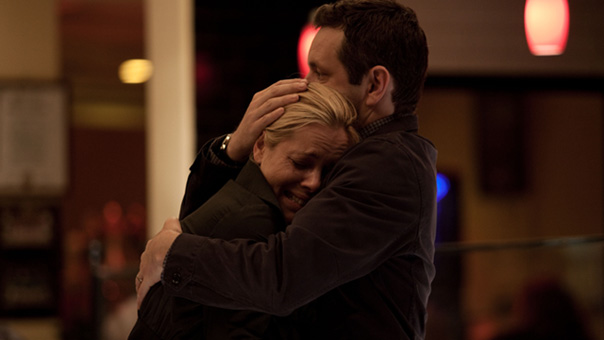
2010.10.28[Event Reports]
10/28 (Thu) Q&A - Competition "The Piano in a Factory": Notes & Quotes

Date & Time: October 28th (Thursday), from 19:30 @TOHO Cinemas Roppngi Hills Screen 6
Appearance: Zhang Meng (director/screenplay), Wang Qian-yuan (actor), Jessica Kam (producer), Choi Gwang-suk (producer)

Here are some notes and quotes:
Zhang Meng (ZM): I very recently finished the post production and so it was my first time to watch the film too! I'm very happy with how it came out.
Wang Qian-yuan (WQY): Thank you for coming to watch this film today. I hope you like this film just as I love Tokyo!
Jessica Kam (JK): This is our Asian premiere and so it's a very special day. I'm glad that we are able to share this moment together
Choi Gwang-suk (CGS): I hope you were able to relate to this to some extent.
Q: Is the woman who divorces the main character a Korean actress?
CGS: That actress is called Jang Shin-yeong, a Korean actress.
JK: We chose a Korean actress for that role, firstly because of commercial reasons. That will probably help us expand our sales in Korea as well. Also, Jang Shin-yeong is a very good actress and she fits the image of the role.
Q: All the actors seemed to have a north eastern Chinese accent. Were they from that part of China?
ZM: Yes. This film was shot in north eastern China in the Liaoning province called Anshan. We used an iron factory in Anshan and another location called Hongqi Tractor Factory.
Q: What is the source of energy and teamwork in the film?
WQY:I see Chen Guilin's leadership is an inevitable result. When he wanted to buy a piano, he couldn't borrow any money and when he tried to steal one, he also failed. So he had no choice but to make one. Yet, perhaps he had the potential to take leadership. I am sure that there are many Chinese people like him.
ZM: When you are under the circumstances of the inevitable, you are able to exert your leadership. Chen Guilin exerted a strong leadership which came from his deep love towards his daughter.
Q: Was the sound of the piano that was competed in the end the actual sound of that piano?
ZM: The actual piano did make some sound, but not as beautiful as the one you heard...!
Q: Many of the factory workers were very heavy smokers. Were they really smoking all those cigarettes?
CGS:The story is set in the 1980s when many people were smoking cigarettes just like those men. There still wasn't much talk about banning smoking. Also, the setting is in a industrial district where most of the factories have been shut down and the workers laid off. I had the actors smoke a lot so that they would make smoke come out of the chimneys that no longer gave off smoke from the factories. So, the actors were chain smoking on site but we had a bucket of water so that they could extinguish their cigarettes right away.
The Piano in a Factory

Film Information
2010.10.28[Event Reports]
Photo Report: 10/28 Guest Appearance
Hi-So: Q&A @ TOHO CINEMAS ROPPONGI HILLS SCREEN5
Guest: Aditya Assarat(Director/Writer/Producer), Soros Sukhum(Producer)
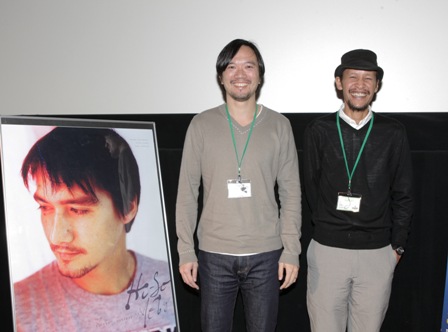
Japanese Eyes
Your Home: Q&A @ TOHO CINEMAS ROPPONGI HILLS SCREEN1
Guest: Kohei Yamakawa(Director/Screenplay/Editor)
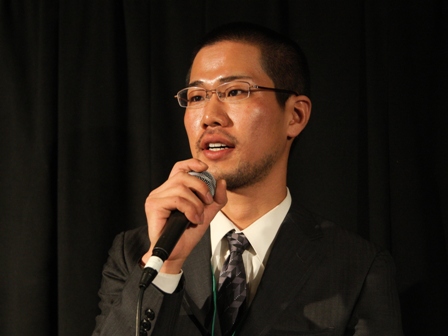
Japanese Eyes
"Japanese Eyes" Special Collaboration with PFF, "The Role of Film Festivals in Japanese Independent Film Industry"ŃĆĆSymposium @ TOHO CINEMAS ROPPONGI HILLS SCREEN1
Guest: Kohei Yamakawa("Your Home" Director/Screenplay/Editor), Naoki Hashimoto ("Birthright"), Tetsuaki Matsue("LIVE TAPE" Director), Keiko Araki(PIA FILM FESTIVAL Director)
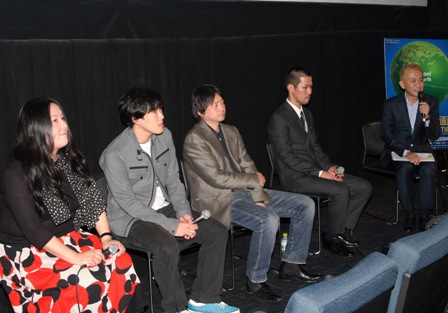
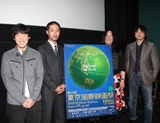
Winds of Asia-Middle East
Magic: Q&A @ TOHO CINEMAS ROPPONGI HILLS SCREEN7
Guest: Koo Hye-sun(Director/Writer)
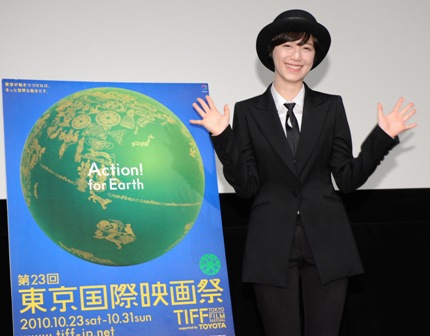
Competition
Never Let Me Go: Q&A @ TOHO CINEMAS ROPPONGI HILLS SCREEN6
Guest: Mark Romanek(Director)
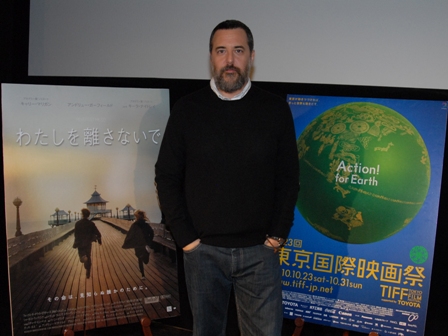
Competition
Sketches of Kaitan City: Stage Greeting @ TOHO CINEMAS ROPPONGI HILLS SCREEN7
Guest: Kazuyoshi Kumakiri(Director), Mitsuki Tanimura(Actress), Ryo Kase(Actor), Kaho Minami(Actress), Kaoru Kobayashi(Actor), Masaki Miura(Actor)
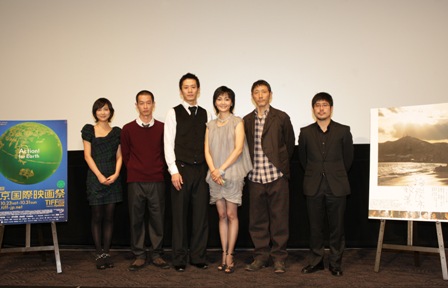
Winds of Asia-Middle East
The Valiant Ones: Talk Show @ TOHO CINEMAS ROPPONGI HILLS SCREEN5
Guest: Koyo Udagawa(Film Critic)
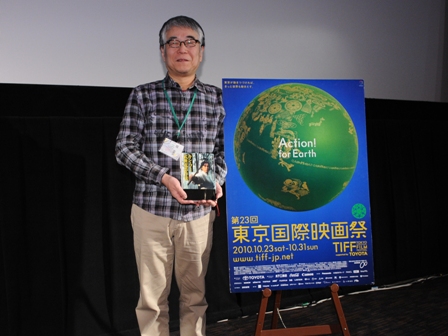
Special Screenings
Shrek Forever After: Stage Greeting @ TOHO CINEMAS ROPPONGI HILLS SCREEN2
Guest: Norika Fujiwara(Voice Cast), Koichi Yamadera(Voice Cast), Hitori Gekidan(Voice Cast)
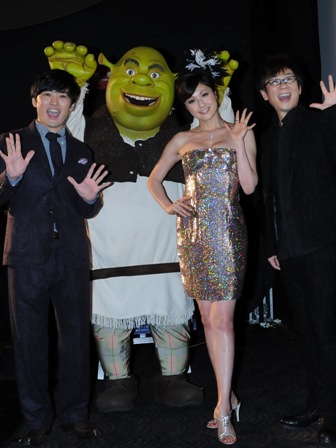
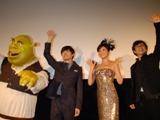
The DGJ New Directors Awards, Screening and Symposium Symposium @ TOHO CINEMAS ROPPONGI HILLS SCREEN1
Guest: Yu Irie(Director), Belma Bas(Director/Screenplay Zephyr), Sinisa Dragin(Director/Producer/Editor If the Seed Doesn't Die), Facilitator: Kaizo Hayashi(Director)
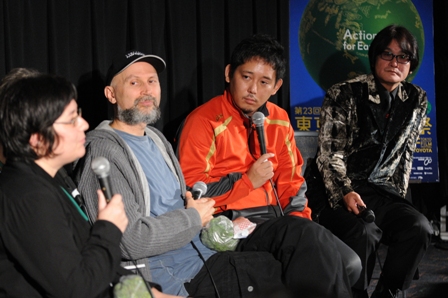
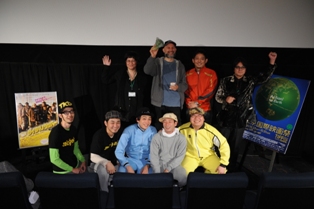
Competition
The Piano in a Factory: Q&A @ TOHO CINEMAS ROPPONGI HILLS SCREEN6
Guest: Zhang Meng(Director/Screenplay), Wang Qian-yuan(Actor), Jessica Kam(Producer), Choi Gwang-suk(Producer)
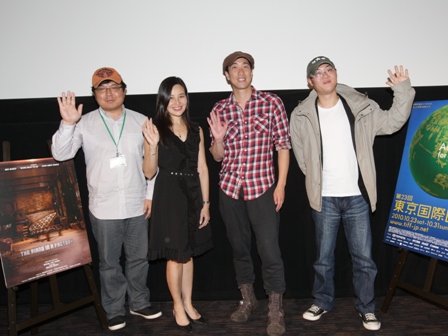
Special Screenings
THE CRAZIES: Q&A @ TOHO CINEMAS ROPPONGI HILLS SCREEN5
Guest: Breck Eisner(Director)
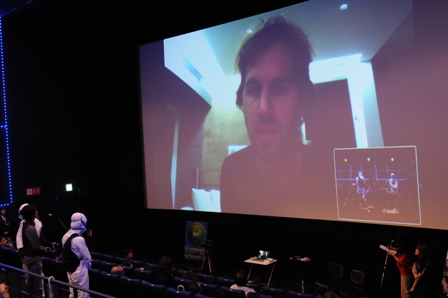
Winds of Asia-Middle East
P.S: Q&A @ TOHO CINEMAS ROPPONGI HILLS SCREEN3
Guest: Yalkin Tuychiev(Director/Screenplay’╝ē
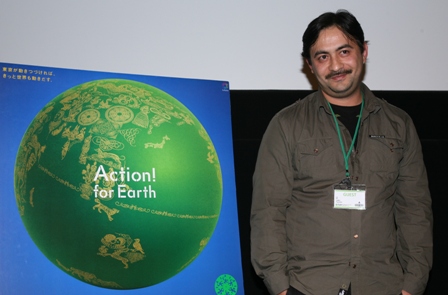 div class="w_cap">©2010 TIFF
div class="w_cap">©2010 TIFFWORLD CINEMA
Of Gods and Men: Q&A @ TOHO CINEMAS ROPPONGI HILLS SCREEN2
Guest: Naomi Kawase (Director)
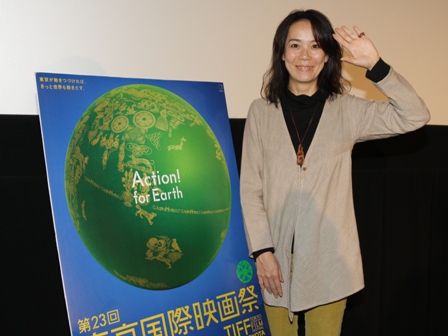
natural TIFF supported by TOYOTA
The Happy Poet: Q&A @ TOHO CINEMAS ROPPONGI HILLS SCREEN1
Guest: Paul Gordon(Director/Producer/Screenplay/Editor)
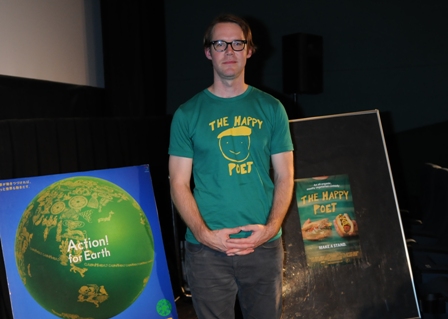
Competition
Beautiful Boy: Q&A @ TOHO CINEMAS ROPPONGI HILLS SCREEN7
Guest: Shawn Ku(Director/Writer)
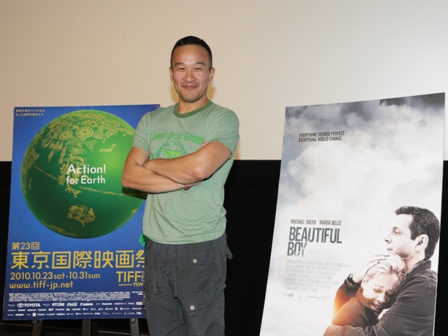
2010.10.28[Interviews]
Competition ŌĆ£The Piano in a FactoryŌĆØ Interview with Zhang Meng (Director) and Wang Qian-Yuan (Actor) (10/28)


---Is it correct to understand that ŌĆ£The Piano in a FactoryŌĆØ is set in the first half of the 1990s in a north-eastern town in China?
Zhang Meng (Zhang): Time and place are not specifically set, but it is certainly set in the period when the heavy industrial area in north eastern China was hit by the policies of reform and openness in China. The state of society from the mid-1980s to the end of the 1990s is the backdrop to the story.
---Why did you choose this period? I believe it was after Deng XiaopingŌĆÖs famous southern tour of China in 1992 when reform and openness gathered pace.
Zhang:In 1992, I was a 17-year-old in north-eastern China. I remember that period in the midst of my adolescence vividly. Every family was hugely impacted by the waves of change. The north-eastern region has regained economic stability now, but it was unstabled in those days. I wanted to make a film about working class people.
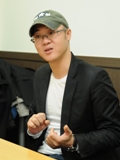
Wang Qian-Yuan (Wang): I am also from north-eastern China. I was still immature in those days, but the air of the period influenced the frame of mind significantly. People who are in an older generation than the director and I, for example my father, my fatherŌĆÖs friends and grandfather, they took the brunt of the change in society. But I was on the periphery and that period really interests me.
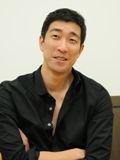
---I wasnŌĆÖt quite sure where the film was going at the beginning, but as soon as they start building a steel piano, it became apparent that Chen and his fellows are all skilled workers. Seedy-looking men begin to glow as the story goes on to the second half.
Zhang: People in that generation are called the ŌĆ£lost generation,ŌĆØ referring to the workers who were thrown out of their jobs in the state factory. The men in ŌĆ£The Piano in a factoryŌĆØ are in a stagnant situation, but in the second half, they return to their disused factory. Through their almost eccentric attempt to build an all-steel piano, they rekindle their skills and rediscover the joy of working.
---Qian-yuan, you look sophisticated, but your character, Chen Guilin, is grouchy and selfish, and yet considerate of his family and friends. Through his limited facial expressions, his character was superbly expressed. Would you tell us about the acting plan and casting, please?
Wang:The director and I discussed the character and created it together. But I just know the air of the men from north-eastern China in those days. They were abrupt just like Chen Guilin. Even those in their 30s looked very mature and old, unlike nowadays. So I tried to recreate the people in my memory.
Zhang:Chen Guilin gradually took shape as I wrote the script. He is tall, slender, and the type of person who looks cold in winter even with a coat on. He is boorish but his gentle eyes give away to the audience that he is a good man. He is somewhat pitiful and everyone ends up caring for him. When his image was set to this point, I thought Wang is perfect for the role. He joined the Central Academy of Drama in 1993, and I joined in 1995. I think we must have been linked by fate.
Wang: Both of us are from the north-eastern region and the same school, and I can rely on him. Also, the directorŌĆÖs father was a film director, and my father was an actor (who makes an appearance as a seasoned engineer). We have a lot in common.
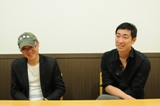
---After your debut work, ŌĆ£Lucky Dog,ŌĆØ you made some documentaries. Do you think the experience is reflected in this film, for example in acting direction?
Zhang:I made two documentaries, and the experience was significant. In a documentary you have to calmly follow the subject. The experience helped me to recreate the recent past realistically. In addition to realism, surrealistic expressions were needed to portray the truth during that period exactly as I remember it. I kept it in mind to create the magic surreal atmosphere where reality and unreality coexist, for example, the scene where the snow falls in the factory. (note: His favorite films are Akira Kurosawa films and Italian neo-realism.)
---Chen builds a piano, initially for his daughter, but it gradually changes its nature to settle his own adolescence. The ending suggests ChenŌĆÖs fresh start while the chimneys, the symbol of the factory, are destroyed. Are these two linked in the theme of an end of a period?
Zhang: The society moves on at speed while Cheng and his colleagues try to remember the time when working class people lived proudly by building a steel piano. However, they know well that they cannot go back to those days. The collapsing chimneys represent the crumpling of their pride. They lose the factory where they spend nearly 40 years, and another change awaits them.
It is possible nowadays to face with a new phase while affirming the life to date. People face with the changes in the society, accept them and adapt to them. That is the theme of this film.
--- I am looking forward to the next film by you both. It would be fun to see Chen Guilin in the corner of another film, carrying on obstinately.
Wang: I hope to work with Zhang Meng again.
Zhang:Shall I add a scene for Chen Guilin on my next film?
The Piano in a Factory
Film Information




